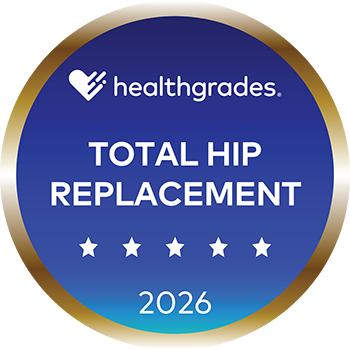Why Get a Hip Replacement?
Hip pain is caused by wear and tear on the joint from aging, arthritis, injury, osteoporosis, or other diseases. When medicines and other therapies don’t relieve pain, a hip replacement can help.
Hip replacement surgery, called hip arthroplasty, removes the damaged areas of the bone and cartilage and replaces them with artificial materials, such as plastic, metal, or ceramic. This allows the joint to move smoothly.
Our orthopedic surgeons specialize in minimally invasive hip procedures, which offer less pain and scarring and a quicker recovery. We work as a team to give you complete care and individual attention, beginning with comprehensive education about hip replacements and what to expect after surgery.
You get personal guidance and support every step of the way, from expert care in the hospital to a personalized rehabilitation plan to help you recover. We coordinate all the care and service you need.
Types of Hip Replacement
We do a comprehensive evaluation and consider your lifestyle and activity level to create a treatment plan that gives you the best results. Our joint replacement specialists use sophisticated imaging equipment to plan the least invasive approaches, which offer less pain and scarring and a faster recovery. You get a more precise fit of the new joint and a more natural joint movement.
Our orthopedic surgeons offer advanced approaches, including:
- Total hip replacement. We replace the hip socket with a plastic cup and use a metal or ceramic ball to replace the top of your thigh bone. We reinforce the thigh bone with a metal implant to provide better stability.
- Partial hip replacement. If only the top of your thigh bone is damaged, we replace it with a metal or ceramic ball, without replacing the hip socket.
- Hip resurfacing. We reshape the top of your thigh bone, cover it with metal, and then line your hip socket with a metal cup. It’s an alternative to hip replacement used in people under 60 with strong bones.
- Hip replacement revision. A previous hip implant may need to be repaired due to wear, an infection, injury, or disease that affects joint function. Revision surgery repairs some or all of the parts. Our team is highly skilled in this complex procedure.

Healthgrades 2026
Our Leading-Edge Hip Replacement Approach
You can count on advanced expertise and a skilled team that specializes in joint replacement. Our specialists use the latest technology and approaches to plan and perform procedures. Our dedicated operating suites, private rooms, and specialized services are designed to ensure your safety, comfort, and well-being.
- Minimally invasive hip replacement. We use sophisticated imaging equipment and a few small incisions to perform surgery. That means there’s less damage to surrounding muscle and tissues, resulting in less pain and scarring and a faster recovery.
- Anterior approach. This advanced procedure is done from the front of your hip, which causes less damage to surrounding muscle and tissues than the more common posterior (back) approach. It uses fewer, smaller incisions that let you recover more quickly and with fewer movement restrictions — like not crossing your legs — after surgery.
- Safe, effective pain management. We use the latest pain management methods to keep you comfortable after surgery, such as nerve blocks, pain medicine shots, and opioid-free pain medications. You get personal attention to ensure your comfort.
- Personalized care. Our care environment is designed just for joint replacement patients, staffed by doctors, nurses, and therapists who specialize in joint replacement care. We make your experience as comfortable as possible.
The Hip Replacement Process
After your evaluation, our joint replacement coordinator will guide you through the entire hip replacement process and take care of all the details. We help you prepare for surgery and recovery.
Most people go home the day after hip replacement, but it depends on your health and the surgery type — in some cases, it can be the same day. Most people recover within about 10 weeks of surgery.
You can expect:
- Pre-surgery preparation assistance. We offer advice to help you get as healthy as possible before surgery with lifestyle, nutrition, and exercise advice — including “prehab” appointments with a physical therapist to evaluate your function and recommend exercises. We also help you plan for your recovery at home.
- Pre-admission testing. We help you schedule routine tests, such as blood tests, to make sure you’re ready for surgery.
- Hip replacement education. You learn everything you need to know about preparing for and recovering after surgery. Our classes and comprehensive patient guide ensure you’re well-informed.
- Walking after surgery. A therapist will help you begin walking the same day as surgery and explain how to perform daily activities and gradually increase activity.
- Hip replacement rehabilitation. We provide physical therapy while you’re in the hospital and outpatient appointments to help you recover once you return home. Our therapists help you regain strength, mobility, and flexibility as quickly and safely as possible.
